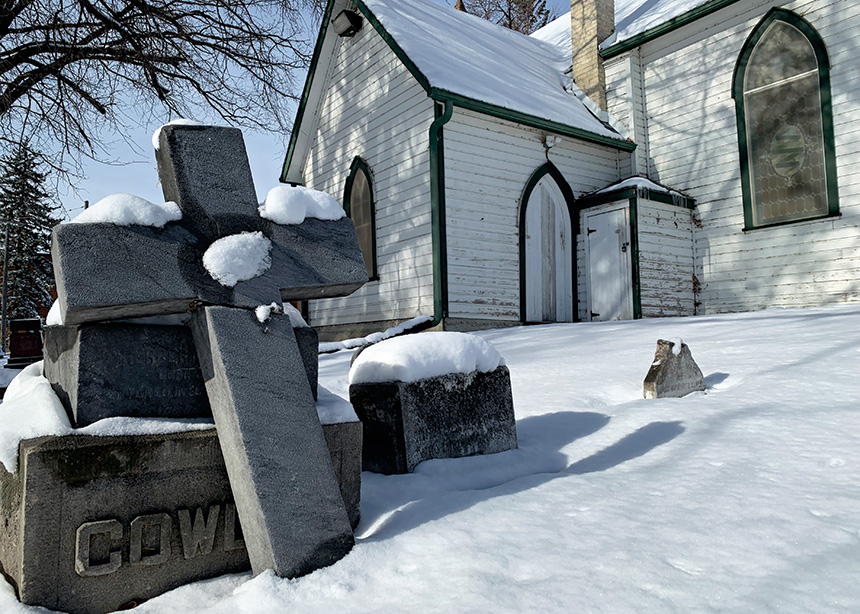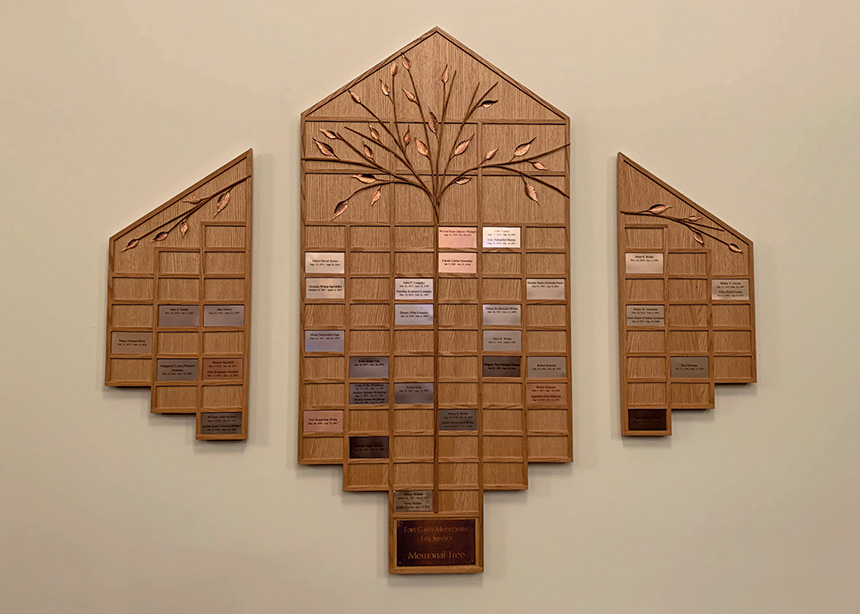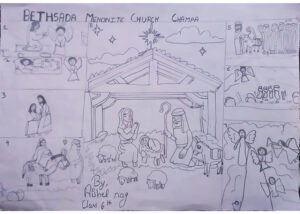There’s one church service that Fran Giesbrecht makes a special point not to miss: Eternity Sunday.
Observed at his Winnipeg church on the last Sunday before Advent, Eternity Sunday provides opportunity for Giesbrecht and others at Fort Garry Mennonite Fellowship to commemorate members of their community who have died.
The church marks Eternity Sunday in various ways. It’s typically reflected in the sermon and the children’s story. There’s a time of remembrance during which congregants can light a candle in memory of a loved one who has died.
A wooden display dubbed “the memory tree,” crafted by one of Fort Garry’s founding members, hangs on one wall of the sanctuary. The church creates a small bronze nameplate for each person in the congregation who has died in the previous 12 months, and the deceased’s family places the nameplate on the tree during the Eternity Sunday service.
Then there’s the video that is looped prior to the start of the service. It includes the names of everyone from Fort Garry who have died since the church was started in the late 1960s.
For Giesbrecht, who joined the church when it was getting started, the video is especially meaningful.
“It’s become a holy moment for me because we remember all the saints,” he says. “Because of my 53- or 54-year history there, when those credits roll, I’m blessed. I’m deeply blessed with memories and I feel that honouring people who have been our fellow travellers over the years is very special.”
Also special for Fran and his wife is the chance to commemorate their daughter-in-law, Jennifer, who died in a car crash in 1994. Remembering Jennifer amid the community that was there for them when their grief was fresh is meaningful to the Giesbrechts.
“There’s a long period of time where your feet don’t feel the ground, and when your church gathers around you, you’re literally carried,” Giesbrecht says. “We light a candle for her every time, every service, in her memory. It’s an honour.”
An adaptation of All Saints’ Day—the Western Christian tradition of remembering and celebrating faithful Christians who have died, observed on November 1—Eternity Sunday has its roots in Germany. There, Totensonntag (Sunday of the Dead) or Ewigkeitssonntag (Eternity Sunday) is a Protestant religious holiday commemorating the faithful departed.
More than a third of Mennonite Church Canada congregations dedicate a service each year to remembering the dead.
Eternity Sunday and Memorial Sunday are the most common names. A couple congregations use Totensonntag and some have given it names like Remembering Sunday and In Memoriam Sunday.
Most churches observe it on the final Sunday of the liturgical year (prior to Advent), while some observe it on the Sunday closest to All Saints’ Day or Remembrance Day.
Like at Fort Garry Mennonite Fellowship, most churches include some element of candle-lighting. Some churches expand their candle lighting to also name other losses, such as the loss of jobs, relationships or good health.
‘We don’t have to be smiley and happy’
At Toronto United Mennonite Church, Eternity Sunday involves flowers.
At the appointed time in the service, people wishing to honour a dead loved one are invited to pick up a carnation at the back of the sanctuary, walk to the front, say the person’s name into the microphone and then place the flower in the vase.
During the pandemic, the church added a slide show that features photos of the deceased, says Anita Tiessen, who chaired the worship committee from 2014 to 2020.
“I found it super powerful because you actually had time to remember the person,” says Tiessen, who has since moved to Waterloo. “It was really, really lovely, actually.”
At Listowel Mennonite Church in southern Ontario, the Eternity Sunday service is not identical every year but always includes a way for individuals to recognize by name their loved ones who have died.
One year, people were invited to write the name of their loved one on a piece of paper. Children collected them and taped them to a wall in the sanctuary.
The service usually includes songs or Bible readings of mourning and an acknowledgement of grief and its impact on church members.
“We don’t have to be smiley and happy that day,” says Nancy Frey, the church’s pastor. “We can bring our sadness and our experience of loss to the worship service and bring that to God in the form of lament.”
Since Frey joined Listowel’s staff in 2019, the church has tended to observe Eternity Sunday on the Sunday closest to November 1. Frey likes to leave the last Sunday of the church calendar for Christ the King Sunday, as designated by the lectionary.
Frey lived for many years in Benin and Burkina Faso, two West African countries where All Saints’ Day is a national holiday, and believes there’s something meaningful about joining Christians in a variety of denominations in remembering people who have died.
“If we’re going to make a day for it, let’s join with the universal church in doing that instead of making it our own thing,” Frey says.
‘She became visible and celebrated’
For Ingrid Loepp Thiessen, there’s one Eternity Sunday that stands out above all others.
As a child, Loepp Thiessen only had one living grandparent—her paternal grandmother—but never got to meet her because she lived in Kazakhstan. Her grandmother died in October 1973, when Loepp Thiessen was 12 years old. She vividly recalls the Totensonntag service at her church, First Mennonite in Winnipeg, that November. She sat with her family, all of them waiting to hear her grandmother’s name.
“On that Memorial Sunday, when my Oma’s name—Margaret Loepp—was read, there was finally an honouring of my invisible grandmother and my own unspoken and hidden life-long grief at her being kept from us,” Loepp Thiessen says. “By speaking her name out loud, she became visible and celebrated. And certainly, she and our relationships with her, as her grandchildren, was honoured.”
Today, Loepp Thiessen lives in Kitchener, Ontario, where she is the spiritual care coordinator at Sunnyside, a long-term care home with approximately 250 residents. It’s a place, she says, where life and death are always touching: between 80 and 100 residents die each year.
Three times annually, Loepp Thiessen organizes a memorial service for residents who have died. “We need those chances to mourn and lament and be outward about what we’re feeling inside,” Loepp Thiessen says. “I’ve learned over the years that can be healing for us.”
She believes it’s important for churches to take time to publicly acknowledge loved ones who have died. “It’s a pause to name what is true inside of us, which is the grief that we carry forever. That person is always going to be gone, so that grief is always going to be there. It’s not going to be ocean swells all the time—sometimes it will be just a ripple—but it’s always there.”
In Loepp Thiessen’s experience, people often shy away from talking about death. “I don’t think people get that grief is always there,” she adds. “We don’t talk about grief. We don’t talk about death. So, let’s have one Sunday a year where it’s OK to do that.”
For churches that want to start observing Eternity Sunday, Loepp Thiessen suggests inviting people to come forward to light a candle in memory of their dead loved one is a simple ritual to start with. She also suggests using the children’s time to discuss death. Above all, mentioning the deceased by name is important.
‘It’s a good time for families’
Back at Fort Garry Mennonite Fellowship, Eternity Sunday is a draw, says Fran Giesbrecht. People who haven’t been to the church in 30 years will show up if one of their loved ones is being honoured. Some even travel from out of province to attend.
“It’s a good time for families,” he says.
Seven members have died in the last year. That’s seven more people whose names will appear in the video on November 26, and seven more small bronze nameplates that will be added to the memory tree.
Giesbrecht anticipates a meaningful morning. “I would say there’s no one who doesn’t feel the sacredness of that service.”
—Corrected November 6, 2023.
Related articles:
As he lay dying
Hold tenderly to death









Leave a Reply
You must be logged in to post a comment.